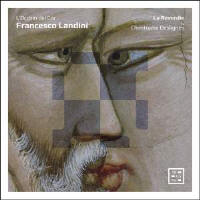Texte paru dans: / Appeared in: Arcana |
|
|
Reviewer: James
V. Maiello Francesco Landini (c. 1330–1397) remains a towering figure of Italian Trecento music. Contemporary sources suggest that the composer and organetto player as famous for his blindness as for his music, and it is at this intersection that one finds the present recording. Joined by organettist Christophe Deslignes, La Reverdie explore the role of sight and the eyes in Landini’s poetry and music. Save for the madrigal Mostrommi amor, the program focuses on Landini’s ballate, a genre most related closely to the French virelai (not the ballade, a false friend) and one of the most popular in Trecento Italy. Davide Daolmi provides insightful liner notes, though I’d skip the awkward English translation and just read the original Italian (or the competent French translation) if you can. I also appreciate very much that the manuscript source used for each selection is identified clearly in the notes, along with major concordances.
La Reverdie are sensitive and expert interpreters of Landini’s music. Whether singing or playing instruments, the musicians take great care not to overplay the composer’s subtle, complex counterpoint or to lose a sense of the overall line in the many virtuosic passages. This is particularly evident in L’alma mie piang’e, in which the singers maintain a sense of mournful gentility as the music wends its way to characteristic under-third cadences. The hocket-esque passages flow seamlessly; moving lines never stick out too much, they simply float into the foreground. The instrumental introductions, verses, and interludes are similarly finely wrought, played with the subdued confidence that comes from decades of experience with this repertoire. The introductions to Gram ‘piant’agli ochi and Per un amante rio tal pena sento may serve to underscore this point.
Deslignes contributes two instrumental arrangements from the Faenza Codex, the first of which, Non arà may pietà, is perhaps Landini’s most famous work, thanks to its inclusion in the Norton Anthology of Western Music. Accompanied by lute and rebec, he renders Landini’s lines with a refreshing crispness that contrasts the vocal selections on the recording. Che pena è questa al cor features Livia Caffagni on recorder, which blends almost too well with the timbre of the organetto. The madrigal Muort’oramai deh misero dolente is one of the highlights of the entire recording, full of shimmering textures and bursts of virtuosity that are tossed off with characteristic sprezzatura. Although there are passages on the disc where one might wish for more clarity in the recording, it is generally clean and lifelike.
| |
|
|
|
|
|
|
|
Cliquez l'un ou l'autre
bouton pour découvrir bien d'autres critiques de CD |
|




